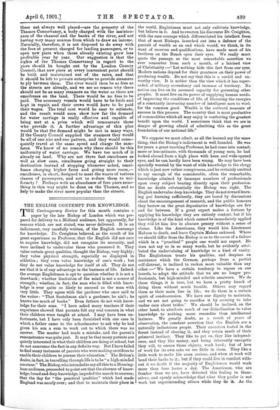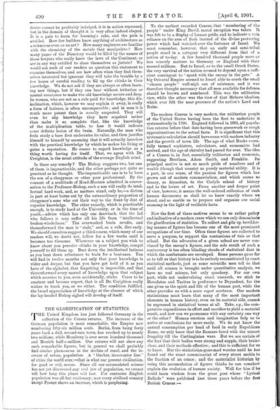- THEENGLISH CONTEMPT FOR KNOWLEDGE.
THE Contemporary Review for this month contains a paper by the late Bishop of London which was pre- pared for delivery to a Midland audience, but apparently, for reasons which are not stated, was never delivered. It is an indictment, very carefully written, of the English contempt for knowledge. Dr. Creighton believed, as the result of his great experience as Professor, that the English did not care to acquire knowledge, did not recognise its necessity, and were inclined to undervalue those who possessed it. They value certain great qualities, thought the Bishop, very highly; they value physical strength, especially as displayed in athletics ; they even value knowledge of one's work ; but they do not value knowledge for itself at all. They do not see that it is of any advantage in the business of life. Indeed, the average Englishman is apt to question whether it is not a drawback ; whether limitation of the mind is not a source of strength; whether, in fact, the man who is filled with know- ledge is ever quite as likely to succeed as the man with very little. They agree with the gardener who once said to the writer: "That Scotchman ain't a gardener, he ain't; he knows too much of books." Even fathers do not wish know- ledge for their sons. "I have asked many teachers if their experience showed that parents felt any real concern in what their Children were taught at school. I may have been un- fortunate, but I have only been furnished with one case in which a father came to the schoolmaster to ask why he had given his son a sum to work out to which there was no answer. The master had made a mistake, and the parent's remonstrance was quite just. It may be that many parents are quietly interested in what their children are doing at school, but do not announce the fact in any definite way. But I have failed to find many instances of parents who were making sacrifices to enable their children to pursue their education." The Briton's desire, in fact, in travelling through life is to be a high-minded amateur." The Bishop,who intendedto say all this to a Birming- ham audience, proceeded to point out that the absence of know- ledge, broad and deep knowledge, impeded the march to success; that the day for 'the practical 'qualities" which had made England was nearly over; and that to maintain their place in the world, Englishmen must not only cultivate knowledge, but believe in it. And to sweeten his discourse Dr. Creighton, with the rare courage which differentiated his intellect from that of most Bishops, launched out into a defence of the pursuit of wealth as an end which would, we think, in its want of reserves and qualifications, have made most of his brethren on the Bench open their eyes. We really must quote the passage, as the most remarkable assertion we ever remember from such a mouth, of a laicised view of Christianity:—" Let nothing hide this fact from our eyes. Modern nations depend for their greatness on their power of producing wealth. Do not say that this is a sordid and un- worthy view. It is nobler than the view which it has super- seded, of military ascendancy and increase of territory. No nation can live on its assumed capacity for governing other peoples. It must live on its power of supplying human needs, of improving the conditions of life, of liberating the energies of a constantly increasing number of intelligent men to work for the common good. Wealth is the outward measure a success in this process. The country that is most productive of commodities which all may enjoy is conferring the greatest benefit upon the world. I sometimes think that we are in danger of growing afraid of admitting this as the great foundation of our national life."
We suppose we must admit, as all the learned say the same thing, that the Bishop's indictment is well founded. He was for years a great teaching Professor, he had come into contact, more or less intimate, with thousands of young men, he had looked abroad from a high place with keen and wide-opened eyes, and he can hardly have been wrong. He may have been specially worried by the want of wide knowledge in the clergy which is just now rather conspicuous, and he certainly omitted to say enough of the considerable, often the remarkable, knowledge attained by immense numbers of professionals upon every subject bearing directly upon their profession. But no doubt substantially the Bishop was right. The English undervalue deep knowledge. They do not reward learn- ing quit learning sufficiently, they, are bored by discussions about the encouragement of research, and the public honours they bestow on the great depositaries of knowledge are few and far between. If a great expert makes a fortune by applying his knowledge they are entirely content, but if his knowledge is of the kind which cannot be immediately applied they will let him live in obscure penury without a sense of shame. Like the Americans, they would kiss Lieutenant Hobson to death, and leave Captain Mahan unkissed. Where we should differ from the Bishop is as to the cause of a failure which in a " practical " people one would not expect. He does not say so in so many words, but he evidently attri- buted the undervaluing of knowledge to a kind of vanity. The Englishman trusts his qualities, and despises an assistance which the German, perhaps from a partial self-distrust, is inclined to reckon more valuable than any other :—" We have a certain tendency to repose on our laurels, to adopt the attitude that we are no longer pro- fessionals, but high-minded and eclectic amateurs. We do these things, it is true, but we have a pretty knack of doing them without much trouble. Others may regard them as their main line in life; we do them in a certain spirit of condescension. We have our dignity to maintain, and we are not going to sacrifice it by seeming to take undue care about trifles.' We should be inclined, on the other hand, to attribute much of our disinclination to value knowledge to nothing more recondite than intellectual laziness. We greatly doubt, as a result of years of observation, the constant assertion that the English are a naturally industrious people. Their ancestors loafed in the forest instead of clearing it, and they retain much of their primeval instinct. They like to get on, they like independ- ence, and they like money, and being inherently energetic they will, to secure those objects, work hard ; but of love of work for its own sake we see little in them. They like a little work to make life seem serious, and when at work will bend their backs to it ; but if they could live in comfort with- out it we doubt if the majority of Englishmen would work more than four hours a day. The Americans, who are franker than we are, have detected this feeling in them- selves, and openly acknowledge that what they prefer is not work but superintending others while they do it. As the desire cannot be profitably indulged, it is in action repressed, but in the domain of thought it is very often indeed obeyed. It is a pain to learn for learning's sake, and the pain is avoided. How few builders know anything of architecture as a science or even as an art? How many engineers are familiar with the chemistry of the metals they manipulate ? How many pages of the Directory would be filled by the names of those lawyers who really know the laws of the Continent, or are in any way entitled to class themselves as jurists ? We would ask such of our readers as question this statement to examine themselves, and see how often when they find them- selves interested but ignorant they will take the trouble by a few hours of careful reading to fill up the chinks in their knowledge. we do not ask if they are always or often learn- ing new things, but if they can bear without irritation or mental resistance to make the old knowledge secure and deep. In women, who are not as a rule paid for knowledge, this dis- inclination, which, however we may explain it away, is really a form of laziness, is often unconquerable ; and in men it is much more potent than is usually suspected. They will even let slip knowledge they have acquired rather than make it SO complete that, like the knowledge of the multiplication table, to lose it would indicate some definite lesion of the brain. Naturally, the man who feels study a bore first underrates its value, and then justifies himself to himself by assuming that it will actually interfere with the practical knowledge by which he makes his living or gains a reputation. He ceases to regard knowledge as a thing 'worth having for itself. That, we agree with Dr. Creighton, is the usual attitude of the average English mind.
Is there any remedy The Bishop suggests two, but one of them is impracticable, and the other perhaps not quite so practical as he thought. The impracticable one is to be born the son of a clergyman or other poor professional. By the consent of a multitude of Head-Masters admitted in conver- sation to the Professor-Bishop, such a son will really do intel- lectual hard work, and, as matters stand, only he,—a dictum in part at least borne out by the extraordinary proportion of clergymen's sons who cut their way to the front by dint of superior knowledge. The other remedy, which is practicable enough, is to study hard at the University, or in the time of Youth,—advice which has only one drawback, that the lad who follows it may suffer all his life from "intellectual broken-windedness." The overworked brain revolts, and thenceforward the man is "stale," and, as a rule, dies early. We should ourselves suggest a third course, which many of our readers will, we doubt not, follow for a few weeks until it becomes too tiresome. Whenever on a subject you wish to know about you perceive chinks in your knowledge, compel yourself to fill them up. Beat down the intellectual laziness as you beat down reluctance to train for a boat-race. You will find in twelve months not only that your knowledge is wider and deeper, but that you have got hold of it as you have of the alphabet, that forgetting is impossible, and that thenceforward every morsel of knowledge upon that subject which accretes to you, even accidentally, sticks. Cease to be amateur and become expert, that is all Dr. Creighton really wishes to teach you, or we either. The condition fulfilled, the broad appreciation of knowledge at the absence of which the lay-headed Bishop sighed will develop of itself.







































 Previous page
Previous page